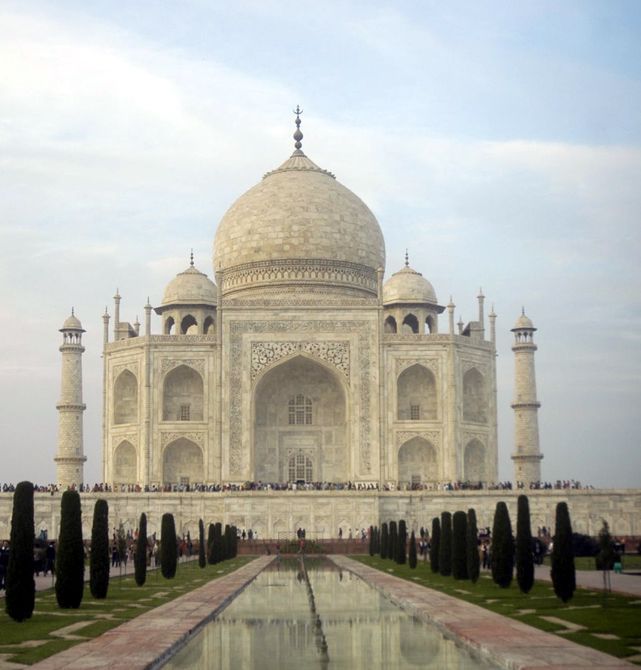'Given the growing animus against the Mughals in the Sangh Parivar, only a brave person will be ready to bet that no harm will ever be done by Hindutva storm-troopers to the Taj,' says Amulya Ganguli.

Photograph: Jayanta Dey/Reuters
Notwithstanding Uttar Pradesh Chief Minister Yogi Adityanath's assurance about the security of the Taj Mahal, few will be able to say with certainty that the threat to the monument has disappeared.
Similar guarantees were given by another UP chief minister belonging to the Bharatiya Janata Party, Kalyan Singh, about the safety of the Babri Masjid. But he could not keep the promise.
The 16th century mosque, which was described as an 'ocular provocation' by Lal Kishenchand Advani -- now in retirement but then riding high as a fiery Hindutva warrior -- was brought down by a saffron mob in his presence 25 years ago.
The Taj, too, has been castigated as a 'blot' on India's heritage by a BJP legislator while others from his party have been dubbing the Mughals as traitors, rapists, murderers, exploiters and destroyers of Hindu temples.
Given the growing animus against the Mughals in the Sangh Parivar (which wasn't there in, say, Atal Bihari Vajpayee's time), only a brave person will be ready to bet that no harm will ever be done by Hindutva storm-troopers to the world famous 17th century mausoleum which, according to BJP MP Subramanian Swamy, was built on stolen property.
Not only that, the saffron brigrade claims that the final resting place of Emperor Shah Jahan and his wife Mumtaz Mahal was a Shiva temple.
Foreign experts were once called to look under the Babri Masjid to see if it was built on a destroyed temple.
It will not be surprising if a similar demand about the Taj is made by the Hindutva camp on the plea of resolving the tomb-temple controversy.
It is obvious that the longer the BJP stays in power, the antagonism and hostility towards the Mughals will persist in the saffron ranks and tend to intensify, thereby posing an incipient danger to the Taj since there will always be some hotheads who will take it upon themselves at least to damage if not destroy it.
It is also obvious that no amount of security will be able to save it just as the Babri Masjid could not be saved.
The BJP will no doubt express regret over any attack on the Taj, just as it did after the Babri Masjid demolition.
But the deed would have been done and, in course of time, the people of India, and the rest of the world, will come to accept the inevitable as in the case of the destruction of the Bamiyan Buddhas or of the countless historical artifacts in Syria and Iraq by Islamic State fanatics.
Arguably, an electoral impact on the BJP of a similar targeting of the Taj by fanatics will not be of such a dimension as to put it out of business.
The last scene in the 1953 version of the movie, ,em>The War of the Worlds, based on H G Wells' famous story about the invasion of Earth by Martians, showed a broken Taj.
It is not known whether India is heading in that direction, but a look at some of the typical tactics of the saffron brotherhood is instructive.
They comprise the gradual building up of a momentum towards the achievement of a desired objective, not by the main party at first, but by secondary outfits or by stray individuals or mavericks, till a stage is reached when what they have been saying acquires a certain inevitability.
The run-up to the destruction of the Babri Masjid started with the Vishwa Hindu Parishad raising the demand for the 'liberation' of Lord Ram's birthplace in 1985 a year after the BJP was reduced to two seats in the Lok Sabha.
The connection between the BJP's political woes and the Parivar's outburst of devotion for Lord Ram is obvious.
The BJP took up the issue in 1989 and the rest is history including the claim that the Ram Janmabhoomi issue has been there for centuries although it did not feature in any of the Jan Sangh's or the BJP's manifestos earlier.
In the case of the Taj, the issue was raised by UP MLA Sangeet Som and has since been followed up by, among others, Subramanian Swamy and an affiliate of the RSS, the Akhil Bharatiya Itihas Sankalan Samiti which wants that either namaaz be banned or that prayers by Hindus be allowed.
A petition has also been filed in an Agra court, demanding that the Taj be declared a temple.
For the moment, all this is low key, with the BJP governments at the Centre and in UP pretending that their focus is only on sabka saath, sabka vikas.
But the pitch is being prepared.
Amulya Ganguli is a writer on current affairs.










